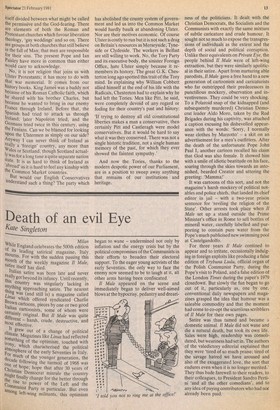Death of an evil Eye
Kate Singleton
Milan While England celebrates the 500th edition of its leading satirical magazine, Italy. mourns. For with the sudden passing this Month of the weekly magazine 11 Male, satire itself has died. Italian satire was born late and never really got beyond its infancy. Until recently, this country was singularly lacking in anything approaching satire. The nearest thing was (and still is) a magazine called „Linus which offered syndicated Charlie Drown cartoons, pieces by one or two good Italian cartoonists, some of ivhom were certainly original. But II Male was quite different — harsh, crude, destructive, and most effective. It grew out of a change of political climate. Magazines like Linus had reflected something of the optimism, touched with irony, which characterised the political atmosphere of the early Seventies in Italy. For much of the younger generation, the decade following the turmoil of 1968 was one of hope; hope that after 30 years of Christian Democrat misrule the country might finally change for the better through the rise to power of the Left and the Communist Party in particular. But even among left-wing militants, this optimism began to wane — undermined not only by inflation and the energy crisis but by the political compromises of the Communists in their efforts to broaden their electoral support. To the eager young activists of the early Seventies, the only way to face the enemy now seemed to be to laugh at it, all other arms having been confiscated.
11 Male appeared on the scene and immediately began to deliver well-aimed blows at the hypocrisy, pedantry and dreari ness of the politicians. It dealt with the Christian Democrats, the Socialists and the Communists with exactly the same mixture of subtle caricature and crude humour. It sought not so much to expose the transgressions of individuals as the extent and the depth of social and political corruption, , Unlike their equivalents on Private Eye, the people behind 11 Male were of left-wing extraction, but they were similarly apolitical in their satire. Apart from nurturing able parodists, II Male gave a free hand to a new generation of cartoonists and caricaturists who far outstripped their predecessors in punctilious mockery, observation and inventiveness. They could be very shocking. To a Polaroid snap of the kidnapped (and subsequently murdered) Christian Democrat leader Aldo Moro, taken by the Red Brigades during his captivity, was attached a caption excusing his dishevelled appearance with the words: 'Sorry, I normally wear clothes by Marzotto' — a skit on an advertisement for a men's outfitters. After the death of the unfortunate Pope John Paul I, another cartoon recalled his claim that God was also female. It showed him with a smile of idiotic beatitude on his face, soaring through the skies towards an astonished, bearded Creator and uttering the greeting: 'Mamma!'
It was cartoons of this sort, and not the magazine's harsh mockery, of political notables and police chiefs, that landed its chief editor in jail — with a two-year prison sentence for 'reviling the religion of the State'. Other arrests took place when II Male set up a stand outside the Prime Minister's office in Rome to sell bottles of mineral water, carefully labelled and purporting to contain pure water from the Pope's much publicised new swimming pool at Castelgandolfo.
For three years II Male contined to appear and to irritate, occasionally indulging in foreign exploits like producing a false edition of Trybuna Ludu, official organ of the Polish Communist Party, during the Pope's visit to Poland, and a false edition of the London Times during the paper's 1979 closedown, But slowly the fun began to go out of it, particularly as, one by one, conventional daily newspapers and magazines grasped the idea that humour was a saleable commodity and that the moment had come to co-opt the scurrilous scribblers of II Male for their own pages.
Satire was thus tamed and became a domestic animal, 11 Male did not wane and die a natural death, but took its own life. Sales were high, readership was consolidated, but weariness had set in. The authors of the valedictory editorial explained that they were 'tired of so much praise; tired of the savage hatred we have aroused and also of the exaggerated love, the sort that endures even when it is no longer merited.' They thus bade farewell to their readers, to their colleagues, to President Sandro Pertini 'and all the other comedians', and to any idea of paying contributors who had no already been paid.






































 Previous page
Previous page